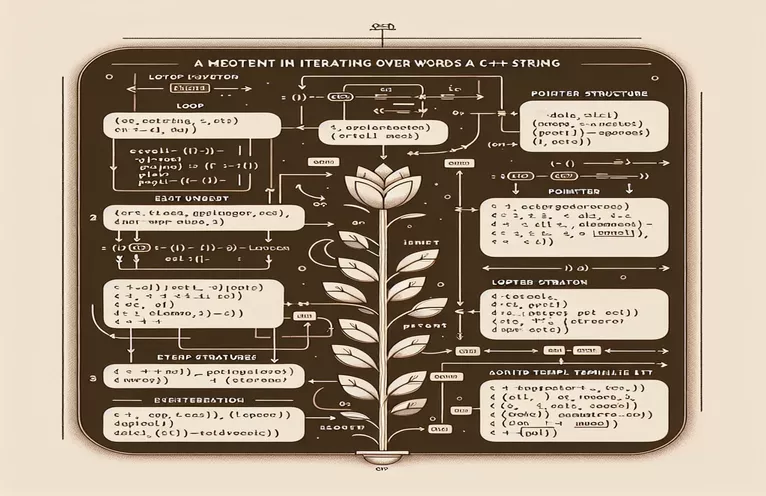Iterating Over String Words Elegantly in C++
When working with strings in C++, one common task is to iterate over the words separated by whitespace. This essay investigates an approach that prioritizes elegance over sheer efficiency, avoiding C string operations and direct character manipulation.
We'll look at one way that uses the standard C++ libraries, notably 'istringstream', to accomplish this in a clean and readable manner. This function offers a powerful approach to parse words in a string, making it ideal for developers that value code elegance.
| Command | Description |
|---|---|
| istringstream | String-based streams can be produced and utilized in the same way that regular input streams are. |
| getline | Extracts characters from an input stream and stores them in a string until a delimiter character is encountered. |
| while (getline(iss, word, ' ')) | A loop that continues reading words from the input string stream, separated by spaces. |
| iss >> subs | Extracts a word from the input string stream and stores it in the subs variable. |
| do { } while (iss) | A loop structure that runs its body at least once, for as long as the input string stream is valid. |
| using namespace std; | Allows you to use all standard library names directly without having to qualify them with std::. |
Understanding Elegant C++ String Iteration.
The first script shows how to utilize istringstream to elegantly iterate over words in a string. Creating a istringstream object with the input string allows us to use it like a typical input stream. Within a do-while loop, the script reads each word from the stream into a string variable named subs and then prints them. The loop continues until the stream is exhausted, demonstrating a basic yet elegant method for interpreting words separated by whitespace. This approach takes advantage of C++'s standard library to provide clear and maintainable code.
The second script provides an alternative way by replacing getline with istringstream. The getline function reads words from the stream until it encounters a space character. This approach uses a while loop that runs till there are more words to read. The getline function is especially handy for handling input streams with non-newline delimiters. Both scripts demonstrate the adaptability of C++'s string and stream handling capabilities, allowing developers to select the solution that best meets their requirements while keeping code readability and elegance.
Istingstream for Elegant String Word Iteration
C++ Standard Library Example
#include <iostream>#include <sstream>#include <string>using namespace std;int main() {string s = "Somewhere down the road";istringstream iss(s);do {string subs;iss >> subs;cout << "Substring: " << subs << endl;} while (iss);return 0;}
Iterating over words. Using std::getline and istringstream.
C++ Alternative Method Example
#include <iostream>#include <sstream>#include <string>using namespace std;int main() {string s = "Walking through the park";istringstream iss(s);string word;while (getline(iss, word, ' ')) {cout << "Word: " << word << endl;}return 0;}
Advanced techniques for iterating over words in C++ strings.
Using the std::regex library is an elegant way to iterate over words in a C++ string. The std::regex library offers a robust mechanism to search for patterns in strings, making it ideal for tasks like word iteration. To iterate over the words in the string, we can define a regex pattern that matches non-whitespace character sequences and utilize std::sregex_token_iterator. This method is not only simple, but also quite readable, particularly for those who are familiar with regular expressions.
To use this method, add the regex header and create a std::regex object with the required pattern. Then, build a std::sregex_token_iterator, initialized with the input string and the regex object. The iterator can then be used to traverse the string. This method is especially effective in complex parsing settings when word boundaries consist of more than simply whitespace. Regular expressions can help improve the flexibility and clarity of your code.
Frequently Asked Questions: Iterating Over Words in C++ Strings
- How can I use std::regex to iterate across words?
- Include the regex header, create a std::regex pattern, and use std::sregex_token_iterator to iterate over the words.
- Can I use delimiters other than whitespace?
- Yes, by changing the regex pattern, you can define alternative delimiters like punctuation or special characters.
- What are the advantages of utilizing std::sregex_token_iterator?
- It provides a succinct and adaptable technique to iterate over phrases using sophisticated patterns defined by regular expressions.
- Are there any performance considerations while utilizing std::regex?
- While regex may be slower than simple string operations, its versatility and readability frequently offset the performance costs in many applications.
- How does std::sregex_token_iterator compare with istringstream?
- std::sregex_token_iterator provides greater flexibility for complex parsing scenarios, but istringstream is simpler for basic whitespace-separated words.
- Can I use std::regex alongside other C++ libraries?
- Yes, std::regex can be combined with other standard and third-party libraries to improve parsing capabilities.
- Is std::regex supported by every C++ compiler?
- Most recent C++ compilers support std::regex, but check compatibility with your individual development environment.
- What are the common pitfalls of utilizing std::regex?
- Ensure that your regex patterns are adequately created and tested, as complicated patterns might be difficult to troubleshoot if they contain errors.
Final Thoughts about Iterating Over Words in a String
Finally, using C++ standard libraries such as istringstream and regex offers a simple and elegant approach to iterate over words in a string. These solutions bypass cumbersome C string routines, providing a more understandable and maintainable solution. Using C++'s built-in capabilities, writers can construct simple and efficient code to manage string word iteration while balancing elegance and utility.


